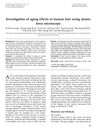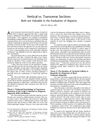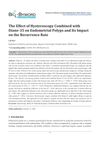 3 citations,
December 2019 in “Journal of Cosmetic and Laser Therapy”
3 citations,
December 2019 in “Journal of Cosmetic and Laser Therapy” PRGF treatments increased hair number and thickness in people with hair loss, with more injections leading to better results.
[object Object]  10 citations,
January 2003 in “Journal der Deutschen Dermatologischen Gesellschaft”
10 citations,
January 2003 in “Journal der Deutschen Dermatologischen Gesellschaft” Hydroxychloroquine helped improve scleromyxoedema in patients, but caused side effects in some.
 18 citations,
April 2016 in “Toxicological Research”
18 citations,
April 2016 in “Toxicological Research” Lavender oil significantly promotes hair growth in mice.
4 citations,
March 2022 in “Pharmaceutics” Regenerative cellular therapies show promise for treating non-scarring hair loss but need more research.

Iron deficiency anemia can cause itching, which often improves with iron supplements.
 9 citations,
March 2019 in “European Journal of Sport Science”
9 citations,
March 2019 in “European Journal of Sport Science” New signs like changes in blood markers, physical symptoms, and behavioral shifts may help detect hidden steroid use in athletes.
 20 citations,
July 2010 in “Skin Research and Technology”
20 citations,
July 2010 in “Skin Research and Technology” Aging makes hair thinner and rougher, with less clear edges.
 July 2024 in “Journal of Cosmetic Dermatology”
July 2024 in “Journal of Cosmetic Dermatology” Vegan collagen builder improves hair growth, skin smoothness, and reduces wrinkles and pain.
 August 2024 in “Current Protocols”
August 2024 in “Current Protocols” The C3H/HeJ mouse model is useful for studying and testing treatments for alopecia areata.
 33 citations,
August 2005 in “The American Journal of Dermatopathology”
33 citations,
August 2005 in “The American Journal of Dermatopathology” Both vertical and transverse sections are useful for diagnosing alopecia, but using both methods together is best.
 7 citations,
September 2014 in “European Journal of Dermatology”
7 citations,
September 2014 in “European Journal of Dermatology” Thicker hair grows faster; hair loss patients have slower growth.
 March 2024 in “Advances in obstetrics and gynecology research”
March 2024 in “Advances in obstetrics and gynecology research” Combining hysteroscopy with Diane-35 improves outcomes and reduces recurrence of endometrial polyps.
[object Object]  41 citations,
December 2008 in “International Journal of Dermatology”
41 citations,
December 2008 in “International Journal of Dermatology” South Korean women with hair loss have lower hair density and thickness compared to healthy women.
 152 citations,
December 2007 in “Gender Medicine”
152 citations,
December 2007 in “Gender Medicine” Male and female skin differ due to hormones, affecting conditions like hair loss, acne, and skin cancer, and suggesting a need for gender-specific treatments.
 77 citations,
July 2013 in “Best Practice & Research in Clinical Obstetrics & Gynaecology”
77 citations,
July 2013 in “Best Practice & Research in Clinical Obstetrics & Gynaecology” Menopause reduces skin collagen and elasticity, and while estrogen therapy can help, its risks require careful consideration.
1 citations,
October 2018 in “Ukraïnsʹkij žurnal dermatologìï, venerologìï, kosmetologìï” Wolvit® (biotin 5 mg) is effective and safe for treating hair loss and scalp conditions in women.
 47 citations,
March 2017 in “Materials Science and Engineering: C”
47 citations,
March 2017 in “Materials Science and Engineering: C” Human amniotic membrane helps heal skin wounds faster and with less scarring.
 April 2016 in “The journal of investigative dermatology/Journal of investigative dermatology”
April 2016 in “The journal of investigative dermatology/Journal of investigative dermatology” M2 macrophages help hair regrowth in wounds by making growth factors.
 42 citations,
October 2012 in “Dermatologic Clinics”
42 citations,
October 2012 in “Dermatologic Clinics” Trichoscopy is a useful tool for diagnosing different hair and scalp diseases without surgery.
 55 citations,
October 2009 in “Clinics in Plastic Surgery”
55 citations,
October 2009 in “Clinics in Plastic Surgery” Burn reconstruction improves with new techniques, materials, and tissue engineering.
 19 citations,
May 2020 in “Cells”
19 citations,
May 2020 in “Cells” Substance from human umbilical cord blood cells promotes hair growth.
 8 citations,
January 2020 in “Skin Pharmacology and Physiology”
8 citations,
January 2020 in “Skin Pharmacology and Physiology” Caffeine improves hair growth, thickness, and reduces shedding.
 20 citations,
February 2001 in “Dermatologic Surgery”
20 citations,
February 2001 in “Dermatologic Surgery” Micropigmentation effectively hides scalp scars with few complications.
 33 citations,
July 2020 in “Journal of The American Academy of Dermatology”
33 citations,
July 2020 in “Journal of The American Academy of Dermatology” PRP treatment improves hair density and thickness for alopecia, but needs more research.
 1 citations,
January 2019 in “Clinical, Cosmetic and Investigational Dermatology”
1 citations,
January 2019 in “Clinical, Cosmetic and Investigational Dermatology” Jarilla-Coffea extract gel effectively and safely increases eyelash and eyebrow thickness in women.
 April 2011 in “Global journal of health science”
April 2011 in “Global journal of health science” Aldactone effectively reduces hair thickness in women with excessive hair growth, both alone and with other treatments.
 129 citations,
January 2009 in “International Journal of Trichology”
129 citations,
January 2009 in “International Journal of Trichology” Trichoscopy can diagnose female hair loss with high accuracy by looking for specific patterns in hair and scalp appearance.
 4 citations,
August 2018 in “Facial Plastic Surgery Clinics of North America”
4 citations,
August 2018 in “Facial Plastic Surgery Clinics of North America” Platelet-Rich Plasma (PRP), a protein-rich extract from a patient's blood, shows promise in improving hair density, thickness, and quality, but the best method of use and number of treatments needed for noticeable results are still unclear.
 42 citations,
March 2014 in “European Journal of Pharmacology”
42 citations,
March 2014 in “European Journal of Pharmacology” Ginsenoside F2 from ginseng may increase hair growth better than standard treatments by affecting cell growth signals.
 23 citations,
September 2015 in “PLOS ONE”
23 citations,
September 2015 in “PLOS ONE” Mesenchymal stem cells, especially injected into the skin, heal wounds faster and better than chitosan gel or other treatments.




























